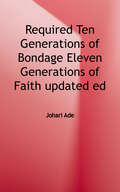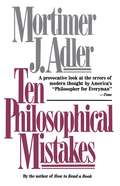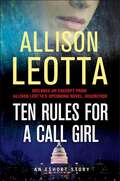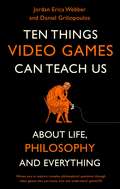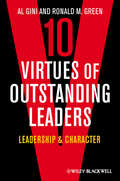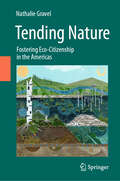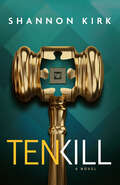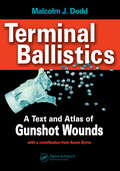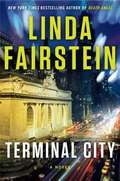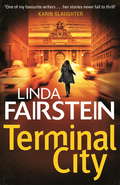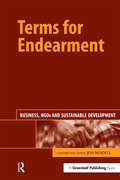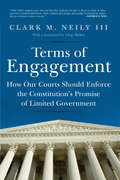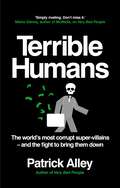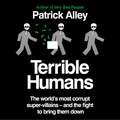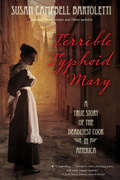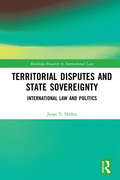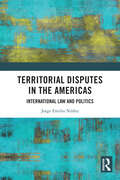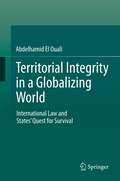- Table View
- List View
Ten Generations of Bondage Eleven Generations of Faith: The Lewis and Green Family History
by Johari AdeTen Generations of Bondage is the true story about an African American family from enslavement to the 21st century. <p><p>The Lewis-Green historical account begins in 1740 when a freeborn Violet sues her employer for unjustly keeping her in bondage. It continues to the year 2012 in the midst of the re-election campaign of Barack Obama, the first African American President. Although the family somehow manages to keep the faith throughout the years, this book takes the reader through unimaginable atrocities that the family must face over the next generations as they journey to the new millennium. <p><p>The author proves that fact is stranger than fiction as the reader learns the story of Syntha, who was sold at least six times; Kitty, a proud African kidnapped from her homeland and arriving in America in chains; and Tom, a Native American who was enslaved while attempting to rescue his wife from it. Even after "freedom" the family must face lynching, murder and many other challenges as they desperately attempt to reconnect their fragmented families. <p><p>Ten Generations of Bondage keeps the reader engaged as the family navigates through the horrors of slavery, the challenges of emancipation, the degradation of Jim Crow, achievements of the civil rights movements, and the demoralization of modern day racism. Despite the degree or the type of bondage, the Lewis-Green family always manages to keep the faith. <p><p>This is a must-read for genealogists, family historians, and anyone wishing to explore the richness of the African American Family.
Ten Philosophical Mistakes
by Mortimer J. AdlerAn illuminating critique of modern thought from America's "Philosopher for Everyman" (Time).Ten Philosophical Mistakes examines ten errors in modern thought and shows how they have led to serious consequences in our everyday lives. It teaches how they came about, how to avoid them, and how to counter their negative effects.
Ten Rules for a Call Girl: An eShort Story
by Allison LeottaFrom former federal sex-crimes prosecutor Allison Leotta, an eShort story about the secret life of Washington, D.C.'s highest-paid escorts.Beautiful Georgetown undergrad Caroline McBride almost has it all--a loving fiancée, a promising academic career, and a college life of fabulous parties--but she can't afford it. When her father becomes ill, plunging her family into debt, she reluctantly agrees to meet Madeleine, the madam of a high-end escort service. Catering to the most powerful men in D.C., Caroline can make more money in one night than in a month at her part-time college job. And no one has to know. All she has to do is follow the madam's ten simple rules. A riveting story of D.C.'s red-light underworld and the life of a modern courtesan, Ten Rules for a Call Girl is fascinating and addictive. Includes an excerpt from Allison Leotta's new novel, Discretion!
Ten Things Video Games Can Teach Us: (about life, philosophy and everything)
by Jordan Erica Webber Daniel GriliopoulosWOULD YOU KILL ONE PERSON TO SAVE FIVE OTHERS?If you could upload all of your memories into a machine, would that machine be you? Is it possible we're all already artificial intelligences, living inside a simulation?These sound like questions from a philosophy class, but in fact they're from modern, popular video games. Philosophical discussion often uses thought experiments to consider ideas that we can't test in real life, and media like books, films, and games can make these thought experiments far more accessible to a non-academic audience. Thanks to their interactive nature, video games can be especially effective ways to explore these ideas.Each chapter of this book introduces a philosophical topic through discussion of relevant video games, with interviews with game creators and expert philosophers. In ten chapters, this book demonstrates how video games can help us to consider the following questions:1. Why do video games make for good thought experiments? (From the ethical dilemmas of the Mass Effect series to 'philosophy games'.)2. What can we actually know? (From why Phoenix Wright is right for the wrong reasons to whether No Man's Sky is a lie.)3. Is virtual reality a kind of reality? (On whether VR headsets like the Oculus Rift, PlayStation VR, and HTC Vive deal in mass-market hallucination.)4. What constitutes a mind? (From the souls of Beyond: Two Souls to the synths of Fallout 4.)5. What can you lose before you're no longer yourself? (Identity crises in the likes of The Swapper and BioShock Infinite.)6. Does it mean anything to say we have choice? (Determinism and free will in Bioshock, Portal 2 and Deus Ex.)7. What does it mean to be a good or dutiful person? (Virtue ethics in the Ultima series and duty ethics in Planescape: Torment.)8. Is there anything better in life than to be happy? (Utilitarianism in Bioshock 2 and Harvest Moon.)10. How should we be governed, for whom and by who? (Government and rights in Eve Online, Crusader Kings, Democracy 3 and Fable 3.)11. Is it ever right to take another life? And how do we cope with our own death? (The Harm Thesis and the good death in To The Moon and Lost Odyssey.)
Ten Things Video Games Can Teach Us: (about life, philosophy and everything)
by Jordan Erica Webber Daniel GriliopoulosWOULD YOU KILL ONE PERSON TO SAVE FIVE OTHERS?If you could upload all of your memories into a machine, would that machine be you? Is it possible we're all already artificial intelligences, living inside a simulation?These sound like questions from a philosophy class, but in fact they're from modern, popular video games. Philosophical discussion often uses thought experiments to consider ideas that we can't test in real life, and media like books, films, and games can make these thought experiments far more accessible to a non-academic audience. Thanks to their interactive nature, video games can be especially effective ways to explore these ideas.Each chapter of this book introduces a philosophical topic through discussion of relevant video games, with interviews with game creators and expert philosophers. In ten chapters, this book demonstrates how video games can help us to consider the following questions:1. Why do video games make for good thought experiments? (From the ethical dilemmas of the Mass Effect series to 'philosophy games'.)2. What can we actually know? (From why Phoenix Wright is right for the wrong reasons to whether No Man's Sky is a lie.)3. Is virtual reality a kind of reality? (On whether VR headsets like the Oculus Rift, PlayStation VR, and HTC Vive deal in mass-market hallucination.)4. What constitutes a mind? (From the souls of Beyond: Two Souls to the synths of Fallout 4.)5. What can you lose before you're no longer yourself? (Identity crises in the likes of The Swapper and BioShock Infinite.)6. Does it mean anything to say we have choice? (Determinism and free will in Bioshock, Portal 2 and Deus Ex.)7. What does it mean to be a good or dutiful person? (Virtue ethics in the Ultima series and duty ethics in Planescape: Torment.)8. Is there anything better in life than to be happy? (Utilitarianism in Bioshock 2 and Harvest Moon.)10. How should we be governed, for whom and by who? (Government and rights in Eve Online, Crusader Kings, Democracy 3 and Fable 3.)11. Is it ever right to take another life? And how do we cope with our own death? (The Harm Thesis and the good death in To The Moon and Lost Odyssey.)
Ten Virtues of Outstanding Leaders
by Ronald M. Green Al GiniWhat makes a good leader? Ten leaders, ten key virtuesThis readable distillation of the core common features of successful leaders shows how an individual's character, and especially their virtue, is the defining factor. Without these ten vital virtues, leadership becomes "misleadership." The authors, both renowned business ethicists, combine theory with fascinating biographical detail on exemplary leaders such as Abraham Lincoln, Winston Churchill, and Oprah Winfrey. The result is an accessible text on the ethics of leadership which, unlike many publications that claim to reveal the secrets of success as a leader, is informed by a wealth of exceptional academic experience.
Tending Nature: Fostering Eco-Citizenship in the Americas
by Nathalie GravelThis book aims to enhance understanding of the foundational principles and ethical considerations of citizen engagement in environmental conservation through an examination of successful cases of shared environmental governance in the Americas. It seeks to inform policymaking on strategies for fostering behavioral change and advancing towards co-management of national public resources and the commons. These cases are analyzed through a geographical lens to provide a framework for reimagining eco-citizenship grounded in bioregionalism. This perspective diverges from the notion of eco-citizenship as a universal culture, advocating instead for its integration within the collective habitats of citizen groups. Readers will gain insights into fostering reconciliation between nature and humanity by empowering diverse stakeholders to lead Blue/Green/Bee conservation initiatives. Emphasizing community learning, environmental awareness, and citizen participation, the book enriches decision-making processes and promotes environmental justice for all living organisms. The selected case studies from Brazil, Canada, Costa Rica, Mexico, and the United States highlight pioneering innovations in Blue/Green/Bee policy planning across urban, periurban, and rural settings. These initiatives propose empathetic and respectful approaches to nurturing our natural surroundings, including methods for co-management, networked urban gardening, wild native bee conservation, water source protection, community-based water management, river revitalization, and metropolitan green space stewardship. This book will be invaluable to students, urban and rural planners, researchers, academics, networking professionals, policymakers, international development practitioners, environmental organization personnel, and enthusiasts of the natural world alike.
Tenkill
by Shannon KirkWHAT WOULD YOU DO IF THOSE YOU THOUGHT WERE FIGHTING FOR JUSTICE, WERE ONLY INTERESTED IN THEIR OWN GAIN? After discovering a corrupt money-making scheme at her own law firm, attorney Greta Seville goes on the run armed with stolen email evidence that could bring the whole company down. With the help of a rag-tag legal team including Greta&’s philosophy-professor brother, a genius litigation technology professional, a possibly-psychopathic (but effective) summer associate, a bulldog investigative reporter and Greta&’s darling boyfriend Henry, the group go after the massive hospital Tenkill that appears to be at the center of the corruption. But people who have high-flying careers to ruin and millions to lose, will kill to keep their secrets buried…
TennCare, One State's Experiment with Medicaid Expansion
by Christina BennettA history of the struggle among competing stakeholders in one of the oldest and most controversial experiments in US health care policy, a precursor to ObamacareIn 1993, Tennessee launched a reform initiative designed to simultaneously expand the proportion of residents with health insurance and curtail cost increases. It was guided by principles that nearly match those that guided the creation of the Affordable Care Act, also known as Obamacare. Like the ACA, TennCare used corporations, rather than a single government payer, to implement the plan, and it relied on a mix of managed care, market competition, and government regulation. While many states cut back on their Medicaid enrollments from 1993 to 2001, TennCare grew from 750,000 to 1.47 million enrollees. The state was less successful in controlling costs, however. Each major stakeholder group (the state, the managed care organizations, the providers, and the enrollees and their advocates) pushed back against parts of the state's strategy that adversely affected their interests, and they eventually dismantled the mechanisms of cost constraint. The author lays out the four stakeholder perspectives for each period in the history of TennCare and provides a link to difficult-to-access primary documents.
TennCare, One State's Experiment with Medicaid Expansion
by Christina Juris BennettA history of the struggle among competing stakeholders in one of the oldest and most controversial experiments in US health care policy, a precursor to Obamacare. In 1993, Tennessee launched a reform initiative designed to simultaneously expand the proportion of residents with health insurance and curtail cost increases. It was guided by principles that nearly match those that guided the creation of the Affordable Care Act, also known as Obamacare. Like the ACA, TennCare used corporations, rather than a single government payer, to implement the plan, and it relied on a mix of managed care, market competition, and government regulation. While many states cut back on their Medicaid enrollments from 1993 to 2001, TennCare grew from 750,000 to 1.47 million enrollees. The state was less successful in controlling costs, however. Each major stakeholder group (the state, the managed care organizations, the providers, and the enrollees and their advocates) pushed back against parts of the state's strategy that adversely affected their interests, and they eventually dismantled the mechanisms of cost constraint. The author lays out the four stakeholder perspectives for each period in the history of TennCare and provides a link to difficult-to-access primary documents.
Tennessee Comprehensive Driver License Manual
by Tennessee Department of Safety Homeland SecurityThe purpose of this manual is to provide a general understanding of the safe and lawful operation of a motor vehicle.
Terminal Ballistics: A Text and Atlas of Gunshot Wounds
by Malcolm J. DoddTerminal Ballistics: A Text and Atlas of Gunshot Wounds begins with a presentation of basic firearms (rifle, pistol, and shotgun) and examines fundamental components of ammunition rounds. The second part of the book deals with the varied patterns of gunshot injury, beginning with the concept of the pathological range of fire determination. Pattern injuries sustained after discharge from handguns, shotguns, and black powder weapons are presented in depth. Further chapters detail more obscure injuries such as those from homemade weapons. The final section deals with more technical aspects of wound examination, including gunshot injury in war and crimes against humanity.
Terminal City (Alex Cooper #16)
by Linda FairsteinWith her newest Alexandra Cooper novel, Terminal City, New York Times bestselling author Linda Fairstein delivers another breakneck thriller that captures the essence of New York City--its glamour, its possibilities, and its endless capacity for darkness.<P><P>Linda Fairstein is well-known for illuminating the dark histories in many of New York's forgotten corners--and sometimes in the city's most popular landmarks. In Terminal City, Fairstein turns her attention to one of New York's most iconic structures--Grand Central Terminal.From the world's largest Tiffany clock decorating the 42nd Street entrance to its spectacular main concourse, Grand Central has been a symbol of beauty and innovation in New York City for more than one hundred years. But "the world's loveliest station" is hiding more than just an underground train system. <P>When the body of a young woman is found in the tower suite of the Waldorf Astoria--one of the most prestigious hotels in Manhattan--Assistant DA Alex Cooper and Detectives Mike Chapman and Mercer Wallace find themselves hunting for an elusive killer whose only signature is carving a carefully drawn symbol into his victims' bodies, a symbol that bears a striking resemblance to train tracks. When a second body bearing the same bloody symbol is discovered in a deserted alleyway right next to the terminal building, all attention shifts to the iconic transportation hub, where the potential for a bigger attack weighs heavily on everyone's minds. <P>With the President of the United States set to arrive for a United Nations meeting at the week's end, Alex and Mike must contend with Grand Central's expansive underground tunnels and century-old dark secrets--as well as their own changing relationship--to find a killer who appears to be cutting a deadly path straight to the heart of the city.
Terminal City: Number 16 In Series (Alexandra Cooper #16)
by Linda FairsteinWith her latest Alexandra Cooper novel, Terminal City, New York Times bestselling author Linda Fairstein delivers another breakneck thriller that captures the essence of New York City -- its glamour, its possibilities, and its endless capacity for darkness.Grand Central Terminal is the very centre of the city. It's also the sixth most visited tourist attraction in the world. From the world's largest Tiffany clock decorating the Forty-Second Street entrance to using electric trains since the early 1900s, Grand Central has been a symbol of beauty and innovation in New York City for more than one hundred years.But 'the world's loveliest station' is hiding more than just an underground train system, and in Terminal City, Alex Cooper and Mike Chapman must contend with Grand Central's dark secrets as well as their own changing relationship.
Terms for Endearment: Business, NGOs and Sustainable Development
by Jem BendellBusiness and NGOs are seen by many to be locked in a perpetual war of values and ideologies. What this book demonstrates is that the war has moved on. Many companies are now engaging with their stakeholders – even those with which they have traditionally had antagonistic relationships – as part of their strategies for improved social and environmental performance. With contributions from an outstanding and diverse group of experts from business, consultancy, research institutes, NGOs and academia, Terms for Endearment investigates the how and why of these new collaborations and provides concrete examples of business working with stakeholder pressure for sustainable development. The book forcibly argues the notion of organizations of civil society setting the standards for business behaviour in the 21st century. For those companies that choose not to pursue high standards of social and environmental performance, confrontation with NGOs must be expected, with negative consequences for sales, costs and social capital, i.e. the bottom line. Terms for Endearment therefore presents business with both a threat and opportunity as we move closer to establishing a social basis for global economic activity.
Terms of Engagement
by Clark M. Neily IIIThe Constitution was designed to limit government power and protect individuals from the tyranny of majorities and interest-group politics. But those protections are meaningless without judges who are fully committed to enforcing them, and America's judges have largely abdicated that responsibility. All too often, instead of judging the constitutionality of government action, courts simply rationalize it, as the Supreme Court did in upholding the Affordable Care Act, which represented the largest-and most blatantly unconstitutional-expansion of federal power since the New Deal.The problem lies not with the Constitution, but with courts' failure to properly enforce it. From the abandonment of federalism to open disregard for property rights and economic freedom, the Supreme Court consistently protects government prerogatives at the expense of liberty. The source of this error lies in the mistaken belief on both the left and the right that the leading constitutional value is majority rule and the chief judicial virtue is reflexive deference to other branches of government. This has resulted in a system where courts actually judge the constitutionality of government action in the handful of cases they happen to care about, while merely pretending to judge in others.The result has been judicial abdication, removing courts from their essential role in the system of checks and balances so carefully crafted by our Founders. This book argues that principled judicial engagement-real judging in all cases with no exceptions-provides the path back to constitutionally limited government.
Terms of Use
by Eva Hemmungs WirténAs a result of the digital revolution and the ever-increasing use of the internet, discussions around the conflict between copyright and the public domain are more prevalent than ever before. While these discussions have been hotly debated by legal scholars and in blogs and online forums, Terms of Use is one of the first books to concentrate on the conceptual foundations of the public domain. Taking an interdisciplinary approach, Eva Hemmungs Wirtén reveals the nineteenth-century origins of contemporary phenomena such as blogs, wikis, the "Creative Commons," as well as the "Open Source" and "Open Access" movements. Hemmungs Wirtén examines topics as diverse as the pharmaceutical uses of plants, the patenting of DNA sequences, and Disney's reworking of Rudyard Kipling's Jungle Books in order to provide a frank theoretical discussion of how nature and culture have been transformed into intellectual property. Timely and provocative, Terms of Use will challenge and inspire readers by providing an original and innovative approach to the understanding of the public domain and its origins.
Terrible Humans: The World's Most Corrupt Super-Villains And The Fight to Bring Them Down
by Patrick Alley'Few people have shown more commitment to investigative journalism than Patrick Alley. His latest book is a vivid, compelling testament to the importance of revealing corruption and wrong-doing and shining a light into dark places, wherever in the world they are.' -Peter Geoghegan, author of Democracy for SaleA small number of people, motivated by an insatiable greed for power and wealth, and backed by a pinstripe army of enablers (and sometimes real armies too), have driven the world to the brink of destruction. They are the super-villains of corruption and war, some with a power greater than nation state and the capacity to derail the world order. Propping up their opulent lifestyles is a mess of crime, violence and deception on a monumental scale. But there is a fightback: small but fearless groups of brilliant undercover sleuths closing in on them, one step at a time.In Terrible Humans, Patrick Alley, co-founder of Global Witness and the author of Very Bad People, introduces us to some of the world's worst warlords, grifters and kleptocrats who can be found everywhere from presidential palaces to the board rooms of some of the world's best known companies. Pitted against them, the book also follows the people unravelling the deals, tracking the money and going undercover at great risk. From the oligarch charged with ordering the killing of an investigative journalist to the mercenary army seizing the natural resources of an entire African country, this is a whirlwind tour of the dark underbelly of the world's super powerful and wickedly wealthy, and the daring investigators dragging them into the light.***PRAISE FOR Very Bad People:'Reads like a John le Carré novel but is, in fact, very real.' -The Big Issue'Part true crime tale, part investigative procedural, this is the account of the brilliant and necessary superheroes of Global Witness, whose superpower is the truth.' -Edward Zwick, Director of Blood Diamond'Very Bad People reads like a non-stop high-speed chase' -David Farr, Screenwriter, The Night Manager'Simply riveting. Don't miss it.' -Misha Glenny, author of McMafia'A clear-eyed account of a world poisoned by dark money, and a welcome reminder that resistance is possible.' -Irish Times
Terrible Humans: The World's Most Corrupt Super-Villains And The Fight to Bring Them Down
by Patrick Alley'Few people have shown more commitment to investigative journalism than Patrick Alley. His latest book is a vivid, compelling testament to the importance of revealing corruption and wrong-doing and shining a light into dark places, wherever in the world they are.' -Peter Geoghegan, author of Democracy for SaleA small number of people, motivated by an insatiable greed for power and wealth, and backed by a pinstripe army of enablers (and sometimes real armies too), have driven the world to the brink of destruction. They are the super-villains of corruption and war, some with a power greater than nation state and the capacity to derail the world order. Propping up their opulent lifestyles is a mess of crime, violence and deception on a monumental scale. But there is a fightback: small but fearless groups of brilliant undercover sleuths closing in on them, one step at a time.In Terrible Humans, Patrick Alley, co-founder of Global Witness and the author of Very Bad People, introduces us to some of the world's worst warlords, grifters and kleptocrats who can be found everywhere from presidential palaces to the board rooms of some of the world's best known companies. Pitted against them, the book also follows the people unravelling the deals, tracking the money and going undercover at great risk. From the oligarch charged with ordering the killing of an investigative journalist to the mercenary army seizing the natural resources of an entire African country, this is a whirlwind tour of the dark underbelly of the world's super powerful and wickedly wealthy, and the daring investigators dragging them into the light.***PRAISE FOR Very Bad People:'Reads like a John le Carré novel but is, in fact, very real.' -The Big Issue'Part true crime tale, part investigative procedural, this is the account of the brilliant and necessary superheroes of Global Witness, whose superpower is the truth.' -Edward Zwick, Director of Blood Diamond'Very Bad People reads like a non-stop high-speed chase' -David Farr, Screenwriter, The Night Manager'Simply riveting. Don't miss it.' -Misha Glenny, author of McMafia'A clear-eyed account of a world poisoned by dark money, and a welcome reminder that resistance is possible.' -Irish Times
Terrible Humans: The World's Most Corrupt Super-Villains And The Fight to Bring Them Down
by Patrick Alley'Few people have shown more commitment to investigative journalism than Patrick Alley. His latest book is a vivid, compelling testament to the importance of revealing corruption and wrong-doing and shining a light into dark places, wherever in the world they are.' -Peter Geoghegan, author of Democracy for SaleA small number of people, motivated by an insatiable greed for power and wealth, and backed by a pinstripe army of enablers (and sometimes real armies too), have driven the world to the brink of destruction. They are the super-villains of corruption and war, some with a power greater than nation state and the capacity to derail the world order. Propping up their opulent lifestyles is a mess of crime, violence and deception on a monumental scale. But there is a fightback: small but fearless groups of brilliant undercover sleuths closing in on them, one step at a time.In Terrible Humans, Patrick Alley, co-founder of Global Witness and the author of Very Bad People, introduces us to some of the world's worst warlords, grifters and kleptocrats who can be found everywhere from presidential palaces to the board rooms of some of the world's best known companies. Pitted against them, the book also follows the people unravelling the deals, tracking the money and going undercover at great risk. From the oligarch charged with ordering the killing of an investigative journalist to the mercenary army seizing the natural resources of an entire African country, this is a whirlwind tour of the dark underbelly of the world's super powerful and wickedly wealthy, and the daring investigators dragging them into the light.***PRAISE FOR Very Bad People:'Reads like a John le Carré novel but is, in fact, very real.' -The Big Issue'Part true crime tale, part investigative procedural, this is the account of the brilliant and necessary superheroes of Global Witness, whose superpower is the truth.' -Edward Zwick, Director of Blood Diamond'Very Bad People reads like a non-stop high-speed chase' -David Farr, Screenwriter, The Night Manager'Simply riveting. Don't miss it.' -Misha Glenny, author of McMafia'A clear-eyed account of a world poisoned by dark money, and a welcome reminder that resistance is possible.' -Irish Times
Terrible Typhoid Mary: A True Story of the Deadliest Cook in America
by Susan Campbell BartolettiWhat happens when a person's reputation has been forever damaged? With archival photographs and text among other primary sources, this riveting biography of Mary Mallon by the Sibert medalist and Newbery Honor winner Susan Bartoletti looks beyond the tabloid scandal of Mary's controversial life. How she was treated by medical and legal officials reveals a lesser-known story of human and constitutional rights, entangled with the science of pathology and enduring questions about who Mary Mallon really was. How did her name become synonymous with deadly disease? And who is really responsible for the lasting legacy of Typhoid Mary? This thorough exploration includes an author's note, timeline, annotated source notes, and bibliography.
Territorial Disputes In The South China Sea
by Jing Huang Andrew BilloHeightened tensions in the South China Sea have raised serious concerns about the dangers of conflict in this region as a result of unresolved, complex territorial disputes. This volume offers detailed insights into a range of country-perspectives, addressing the historical, legal, structural, regional and multilateral dimensions of these disputes
Territorial Disputes and State Sovereignty: International Law and Politics (Routledge Research in International Law)
by Jorge E. NúñezAdopting a multi-disciplinary approach, this book opens new ground for research on territorial disputes. Many sovereignty conflicts remain unresolved around the world. Current solutions in law, political science and international relations generally prove problematic to at least one of the agents part of these differences. Arguing that disputes are complex, multi-layered and multi-faceted, this book brings together a global, inter-disciplinary view of territorial disputes. The book reviews the key conceptual elements central to legal and political sciences with regards to territorial disputes: state, sovereignty and self-determination. Looking at some of the current long-standing disputes worldwide, it compares and contrasts the many issues at stake and the potential remedies currently available in order to assess why some territorial disputes remain unresolved. Finally, it offers a set of guidelines for dispute settlement and conflict resolution that current remedies fail to provide. It will appeal to students and scholars working in international relations, legal theory and jurisprudence, public international law and political sciences.
Territorial Disputes in the Americas: International Law and Politics
by Jorge Emilio NúñezTerritorial disputes are intricate, shaped by historical, legal, geopolitical, social, cultural and other factors. This book uses a multidimensional approach to assess real case scenarios across the Americas, individually and collectively.The work evaluates a selected sample of these disputes, tracing origins to colonial histories, unclear border demarcations or uncharted lands, and challenges enforcing legal boundaries. It then explores critical thematic areas, illustrated with compelling examples—disputes entangled with non-American agents like European nations; colonialism, neo-colonial interference and pervasive colonial mindsets; ongoing, regional differences between neighboring states; and the intricate, sometimes conflicting roles of indigenous communities and implanted populations asserting self-determination, often diverging from states’ interests. The work reveals sovereignty and disputes intertwine, encompassing plural agents, roles, contexts, realms and modes of existence beyond traditional views. Cases like the Falkland/Malvinas Islands, Mexico-US border, Amazon region and Antarctica highlight how regional organizations and alliances could enhance peacebuilding, strengthen American states against external powers and challenge traditional unidimensional scholarly approaches with a nuanced, comprehensive perspective.The book will appeal to researchers, academics and policymakers in the areas of Public International Law, Political Science and International Relations, Legal Philosophy, Political Philosophy and Jurisprudence.
Territorial Integrity in a Globalizing World
by Abdelhamid El OualiThis book offers a comprehensive, highly informative and interdisciplinary study on territorial integrity and the challenges globalization, self-determination and external interventions present. This study aims at not only to fill an epistemological gap in this regard, but also answer the question of whether International Law is adequately equipped to help states address these challenges. The author argues that the biggest threat that many states are confronted with today is their disintegration rather than their obsolescence, and that International Law has not often been able to prevent that eventuality. In fact, states, when they were not destroyed by war, managed to survive, thanks to the flexibility of territoriality, i.e. their ability to adjust to difficult situations as they arose. It is this understanding of adaptation that urges an increasing number of states today to revive territorial autonomy and restore an original understanding of self-determination in which democracy is a pivotal factor in establishing congruence between the states and their nations. While this move is endorsed by International Law, it is not the case for globalization; for their own sake, proponents of globalization should recognize that the states are irreplaceable as long as they remain the sole providers of protection for their peoples.
